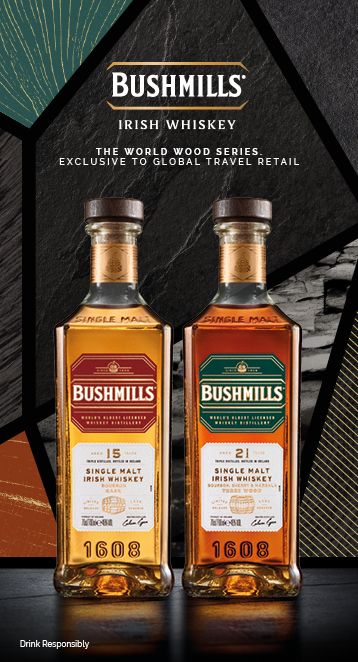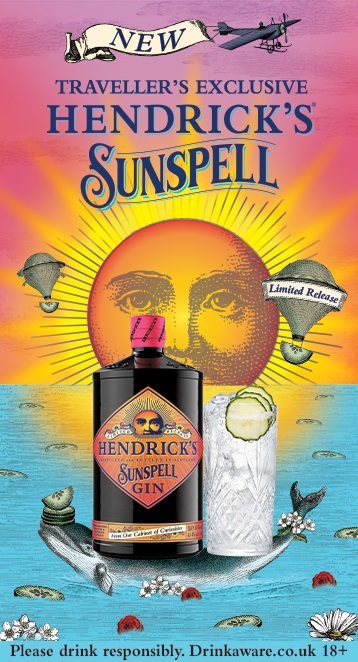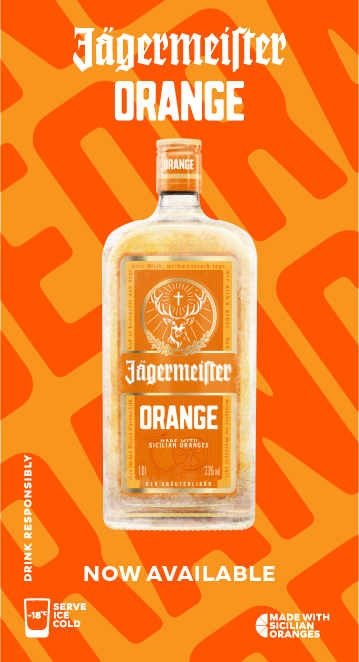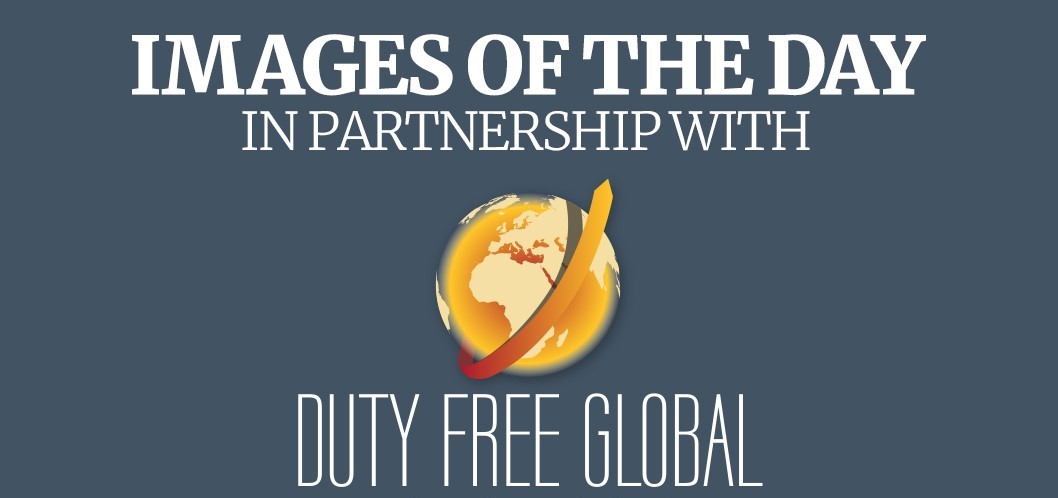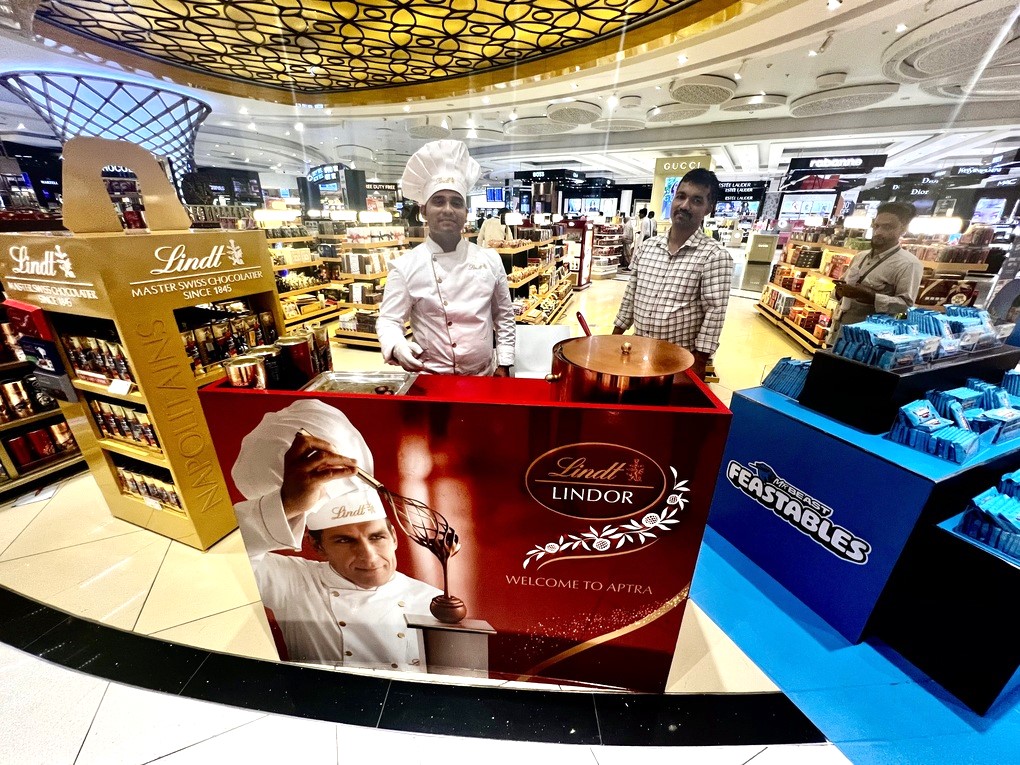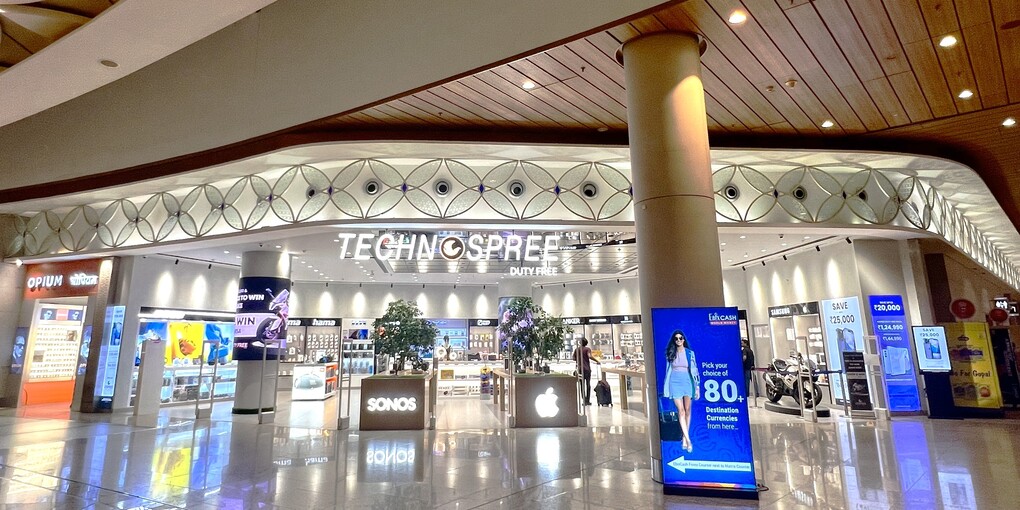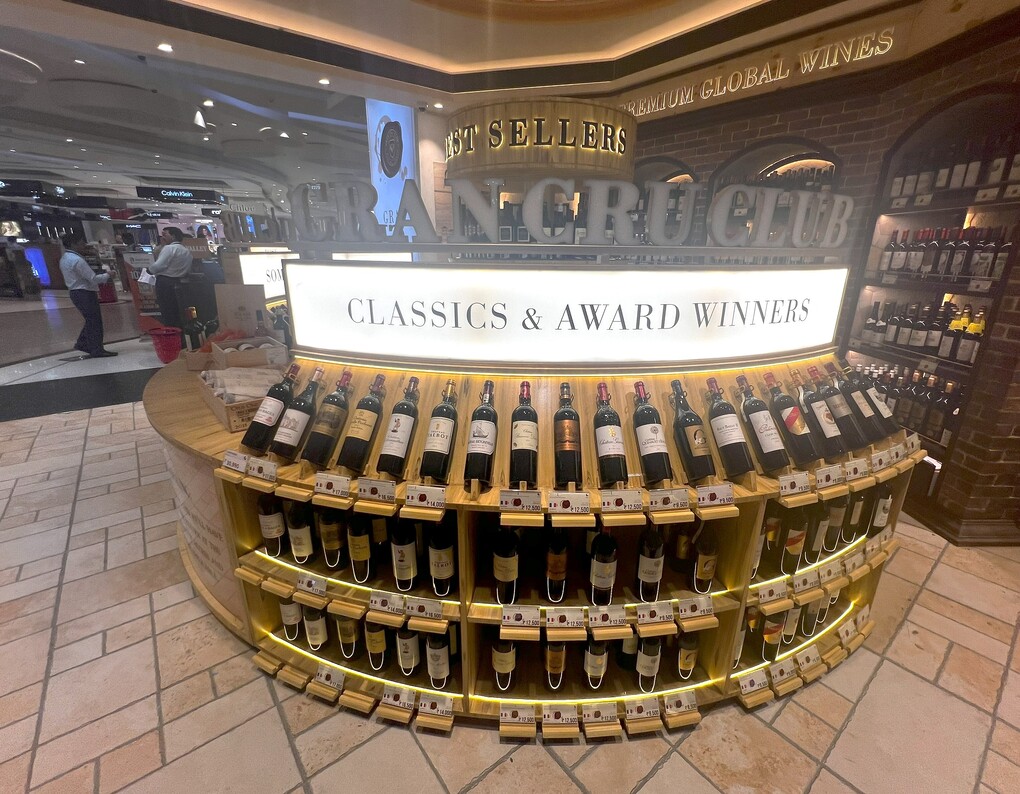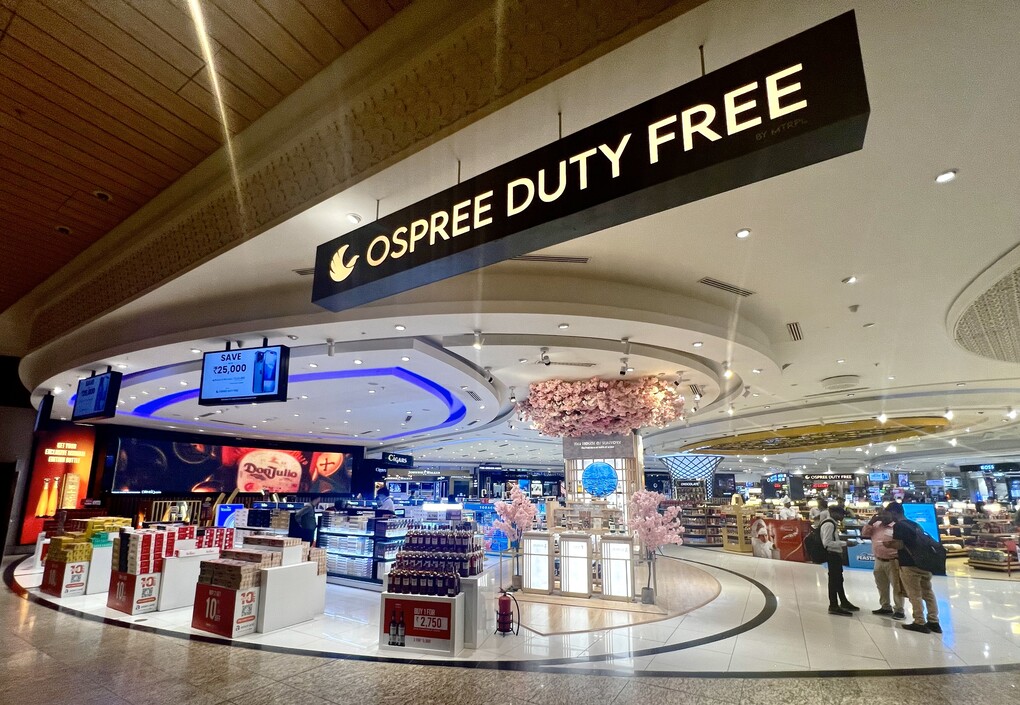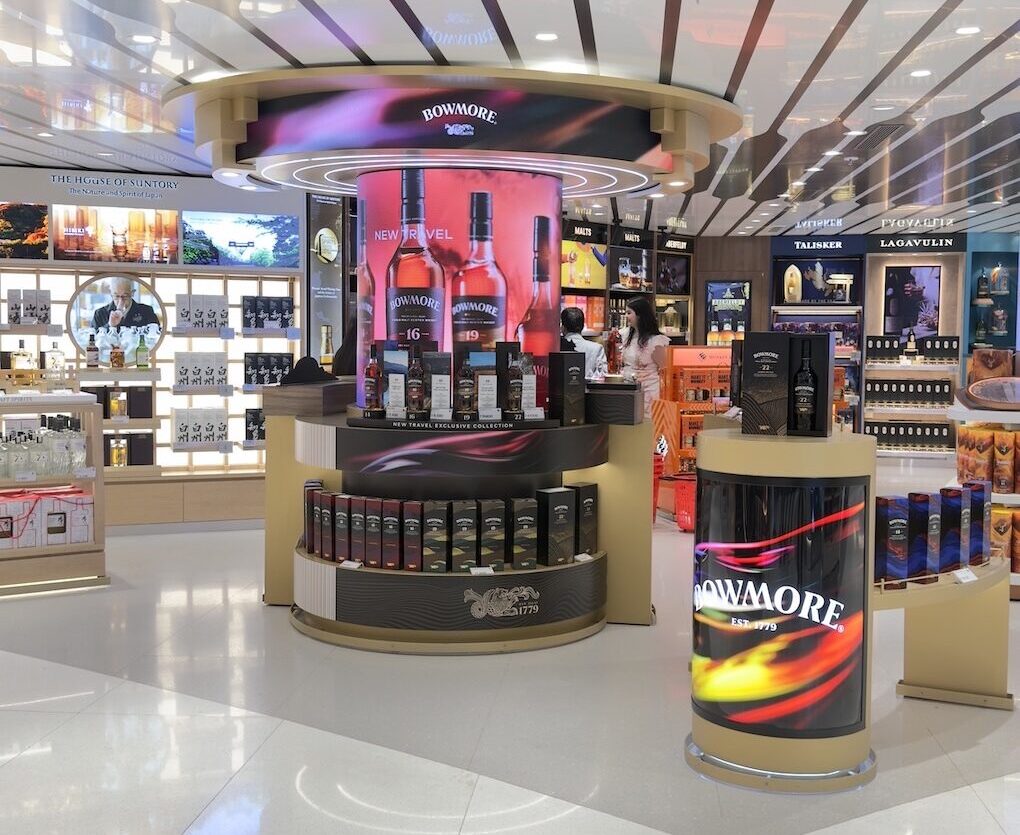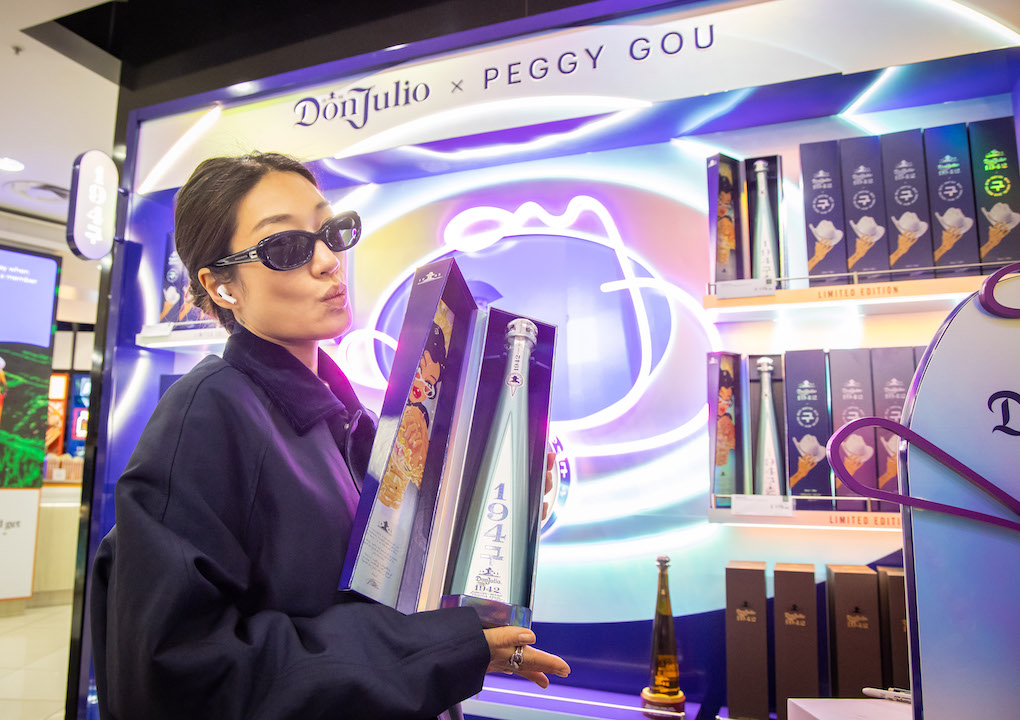 |
“Bacardi is performing well, and we are growing market share ahead of the elite suppliers. We just believe we can perform even better.“ |
Mike Birch |
From a highly successful 15-year local-market career with Bacardi, Mike Birch has stepped into an entirely new channel – one which he admits has unique conditions and challenges, but which also offers great opportunities.
When he heard of the impending vacancy he was drawn to travel retail’s status as shop window and serious value generator, a dual function that ensures vital senior management support. That support, Birch says, has been stepped up in recent years since Bacardi Global Travel Retail was set up as a stand-alone division in 2006.
“Andrew [Carter – Birch’s predecessor] did a great job in raising the profile in the trade,” he explains. “Plus there’s been an additional shot of adrenaline on top of that, starting with the [March 2012] appointment of Ed Shirley, our global President and CEO, who had amazing experience and success with Gillette and Procter & Gamble, and specific experience of travel retail.
“He is obviously very pro the channel, and very keen to see us perform even better. Bacardi is performing well, and we are growing market share ahead of the elite suppliers. We just believe we can perform even better.”
“A second shot of adrenaline” came with the July appointment of Ron Anderson as Senior Vice President and Chief Commercial Officer. The former head of Diageo’s travel retail business, to whom Birch reports, is a member of the Bacardi Leadership Team – a vital internal affirmation of the channel’s importance.
“Ron is in charge of the company’s commercial effectiveness, and he also has a huge wealth of experience, at Diageo in particular. A big part of that was what he managed to do there in terms of building the travel retail business,” says Birch. “He has a whole load of experience that will accelerate my learning. We’ll be talking about customer strategies and routes to market that perhaps otherwise would’ve taken a year or so to get to.
“So I think it’s safe to say that both Ed and Ron “˜get it’ [travel retail] very firmly. As Managing Director, I’m charged with leading our agenda and driving our performance forward. I expect them both to be very challenging with me on that agenda, and I really welcome that.
A passionate FMCG man A father of two young children (boy and girl) with a keen interest in sport, Mike Birch has been in business for 25 years since graduating from Nottingham University in the UK. From there he joined Coca-Cola – “eight fantastic years” in various sales and marketing roles. “What I took out of that was a huge sense of the power of brands, and that has stuck with me,” he says. “You’ll see that throughout my career. “I moved on to a crazy two years at Virgin. We (pretty much me, two other people and Richard Branson) launched Virgin Cola. We were flying around in helicopters and doing launches to various grocers, and being slightly crazy.” From there he joined Bacardi, back in the FMCG business he had developed a taste for at Coca-Cola. “I just found that I loved it,” he recalls. “It seemed to me to be the perfect match for the best of Coke, and their focus on brand-building, and the best of Virgin in terms of autonomy. Hence I’m still here 15 years later. “Within Bacardi I started off in the UK business, and did mostly sales roles. For the past five years I was UK Sales Director. I went through all the UK off-trade sector’s period of consolidation. There are some similarities to the travel retail situation today compared with 15 years ago in the UK off-trade in terms of the number of key players and their market share – about 30% for the top five, for example.” |
“I think the outcome of all of those things wrapped together will be that the profile of travel retail within Bacardi will significantly increase. That can only be a good thing for us, and especially for our customers and our consumers. So it seems to be a virtuous circle of change that’s coming to bear on top of what was already an increased focus.”
The recent headlines have been on the company’s upper management, but Birch is quick to point to the quality and depth of the leadership team that reports to him. “It’s got a fascinating mix of very passionate, experienced people in terms of travel retail. We’re very progressive in marketing and finance, and we’ve got people with very lengthy experience in travel retail, including people who have worked on the retail side.”
So what have been his early priorities in the job? Firstly, getting to know the channel and his team, he says. “The team has been performing well, and I’ve really been focusing on getting out and about. I’ve met pretty much 99% of the Bacardi team – over 70 people – as well as many promoters, and talked to many people in the stores. We’ve probably been to about 20 of the big airports and a couple of the cruise operators, so I think I’m getting a very good understanding. I’ve met about 30 customers already.
“Everybody is telling me about Cannes, which I’m very excited about. It’s going to be a really great opportunity to meet and talk to customers, and I’m really looking forward to it.
“I can already see that the airport business is going to be a fascinating and exciting arena, for a number of reasons. Somebody coined the phrase to me that airports are the cathedrals of the 21st century. I was lucky enough to get a sneak preview inside the new airport at Mumbai [the all-new Terminal 2 at Chhatrapati Shivaji International Airport -Ed], and it’s astonishing, truly astonishing. You can begin to see the amount of love that goes into the project. It’s an enormous source of national pride.
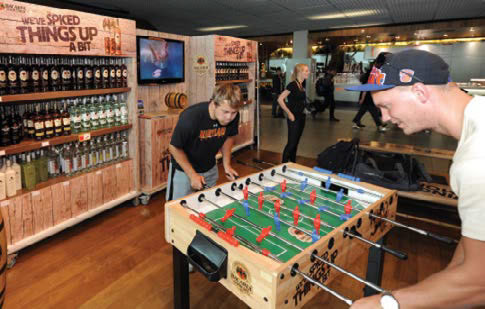 |
Playing to win: Airport activations such as this one for Bacardi OakHeart at Amsterdam Airport Schiphol aim to drive consumer awareness and engagement |
“The space is enormous, and the retail environment is sumptuous. And I can only see that trend increasing at other airports, which provides opportunities for everybody. In terms of the cruise business, there will be highs and lows, and I think it’s quite flat at the moment; but I think the long-term trend is to grow, driven by demographics – and if Asia gets to grips with it, it could be enormous.
“Within the border channel, I’ve seen some of the operators’ border stores, which are as sophisticated as any
global retailer I have seen, and more luxurious in many ways. I see a big transformation coming in terms of
border stores. There’s also a very interesting area emerging in terms of duty free zones [such as offshore duty free shopping on Hainan Island, China -Ed] – what that that ends up looking like, and how we manage it, is key. Overall it’s very exciting.”
 |
Bombay Sapphire: A key strategic brand with a strong market position and a big future, says Birch |
REGIONAL VARIATIONS AND PRIORITIES
As with all his peers, Birch sees noticeable differences in consumer sentiment, passenger trends, and spending power and patterns by region. “Clearly, in terms of passenger travel in the short term, Europe is depressed. I’m not an economics expert, but our business will reflect that to some extent. Asia’s growth rate has slowed, and my role and the team’s role is to make sure that we come up with plans for customers to build back that growth.
“We see different dynamics across sub-segments of Asia, and also within our portfolio we have very different dynamics. For example, our performance in India and how we can target those passengers is very interesting. We’re seeing the Indian passenger very strongly interested in Grey Goose, for example.
“In China we have different challenges around our Cognac proposition [Otard] and so on. We see huge opportunities, and we are looking at very close targeting of individual passenger flows across Asia.”
Birch’s perception of a slight slowdown in Asia and, worryingly, in China, is shared by many of his brand and retailer counterparts. But the channel cannot just rely on traffic increases for growth, he says, noting that retailers and brands must build plans to compensate for the inevitable highs and lows of a channel innately vulnerable to the world around it.
To help achieve that, he predicts an increase in retail sophistication at many levels, for example in information sharing. “We would like to see more sophistication in terms of how retailers share information and data with a supplier base,” he comments. “You can see that the success of Tesco and Wal-Mart has been driven very much by those retailers doing such things. It’s in everybody’s interests that we get better in that area as an industry.”
Based on his domestic market experience, he believes further industry consolidation at retailer level [a marked trend of the past five years] is inevitable “as the best get bigger and better”. However, the channel’s unique concession-dominated business model may constrain that process, he notes.
“I have enormous empathy for the complexity in which those retailers have to plan their business, and there are also big inconsistencies in the lengths of contracts,” Birch observes. “Some of the contract durations seem very difficult to sign up to in terms of how you manage your business.”
But, he says, as retailers get more sophisticated and the balance moves from how much the tender is worth financially to what it’s also worth in terms of experience and ability to grow the business – and that becomes more evident in the data that retailers are able to share – then such experience will become a bigger factor. “Hopefully that will lead to longer contracts, because I think we would be able to invest more. Even a change in retailer is downtime in terms of driving consumer sales.”
Another dynamic Birch notes is around the enormous growth of airport retail space, and the equally intense competition for it. “You can see the interest in travel retail growing enormously in the future, with a lot of
luxury brands which will be competing fiercely for space,” he says. “For existing luxury brands, and certainly
within spirits, that’s already true.
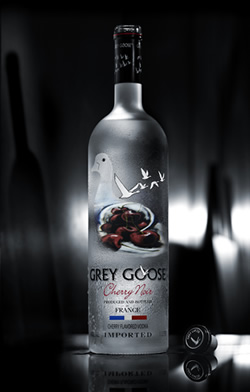 |
Grey Goose is “an incredibly exciting brand” Birch says. Pictured is Cherry Noir, the first new flavour variant in five years |
“However I think the observation of suppliers within the spirits sector is that the health of the business is almost screaming out to have stronger “˜challenger’ suppliers [the next tier under the majors -Ed]. We have a unique opportunity be a very strong challenger supplier.
“It’s our job to give something else to the customers, and I think we really have a unique opportunity to do that. We have some fantastic brands, in brand-leader positions. We have a very strong position and market share in rum with Bacardi; a very high market share with Bombay Sapphire in travel retail; and an incredibly exciting brand in Grey Goose, which is very strong at the premium end of vodka.
“I think we need to spread our representation more, but we can offer to customers a good position in wines and spirits that enables them to give a broader offering to their consumers beyond the big category giants of Cognac and blended Scotch.”
Bacardi does have strong brands in those two categories in Otard and Dewar’s, respectively, but Birch acknowledges that the company under-performs in travel retail – “so that has to represent opportunity”.
“But the interesting thing for me is that we underperform in premium,” he adds. “So our opportunity to premiumise is very significant, and that will be one of the priorities that I have moving forward.
“Blended Scotch is the hardest and clearly the biggest sector. It has two fantastic mega-brands in Chivas and Johnnie Walker, and there are some very strong local brands. I think the solution for us in blended Scotch is to find a solution for Dewar’s, and I believe that we’re working very strongly on that at the moment. We’re in a position to add fuel to the fire through travel retail, and that would be our strategy in blended Scotch.
“In Cognac it’s slightly different because I believe there is more of a category view [among retailers]. Clearly there are some fantastically strong brands, but there are significantly fewer and the barriers to entry through Cognac’s appellation controllée system are very high. So there are pretty much only six or seven brands that can move forward globally.
“With the short-term pressures on supply, I would like to think that we can respond to many customers’ requests. If they want to build their business, I believe we can work very strongly with Otard, which is a fantastic liquid with a fantastic heritage to rival and equal all of the other major Cognac brands.
“Our opportunity with Otard is to build our business in VSOP and above and to work closely with retailers. Certainly we have already started to invest more money behind that, and we would expect that to continue.”
So how would he sum up his experience to date, and his agenda for the future? “There are three priorities,” Birch replies. “The first is to not disrupt our business. We are growing market share; we’re performing well; we have a strong, experienced, passionate team; and I’m very proud of the work that they’ve done so far.
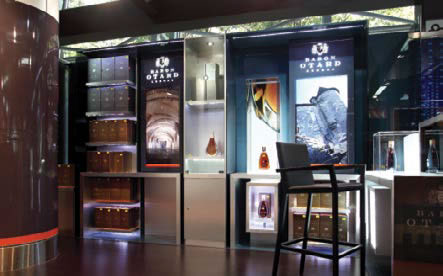 |
Otard: “a fantastic liquid with a fantastic heritage to rival and equal all of the other major Cognac brands” |
“Secondly, we need to accelerate our growth and market share, and partly we can do that through premiumisation. We have a plan to do that, and to tie in much more aggressively into the innovation agenda. A lot of companies have talked about innovation, and we’ve talked about it in the past, so we need to actually see the results. There is a stream of travel retail exclusives and limited editions coming, and I know that travel retail will be much higher on the agenda when we come to global innovation launches.
“And thirdly I think equally, very importantly – and leveraging my experience in the UK and in my recent role in sales – we have a big opportunity to add more value to the customer-specific agenda, and there’s a lot more we can do to develop winning programmes.
“We do a lot on our branded programmes. We’ve invested a lot of money and we’re doing well, but I think if we can get more tailored solutions for customers against their individual priorities, then we will take a step forward in terms of how we perform.”
Birch is clearly relishing the challenges. “It’s a cliché, but I’m loving it,” he says. “I’m really excited by it. I think it’s a fantastically diverse, dynamic sector with its own challenges – but also it’s such a broad spectrum, not only of channels but of countries and markets.
“I can see all the trends only adding to that level of interest in terms of growth, of new data coming through, of customer sophistication, and of increased competition with suppliers, not just within spirits but across the board.
“I think it’s a great time to be here – everybody told me I’d love it, and they’ve been right so far.”


